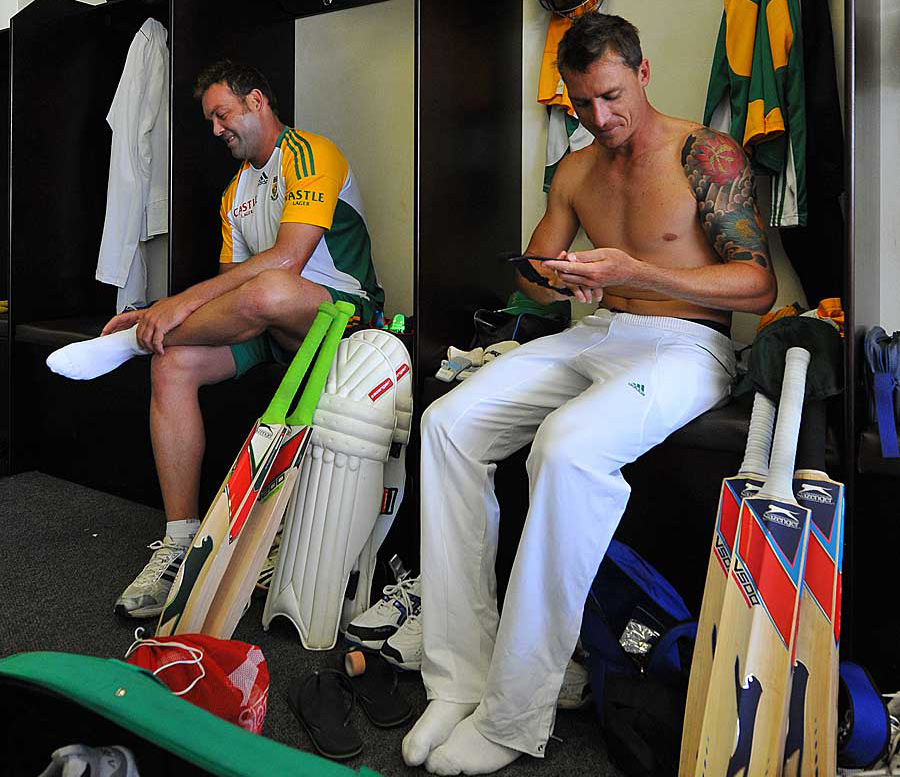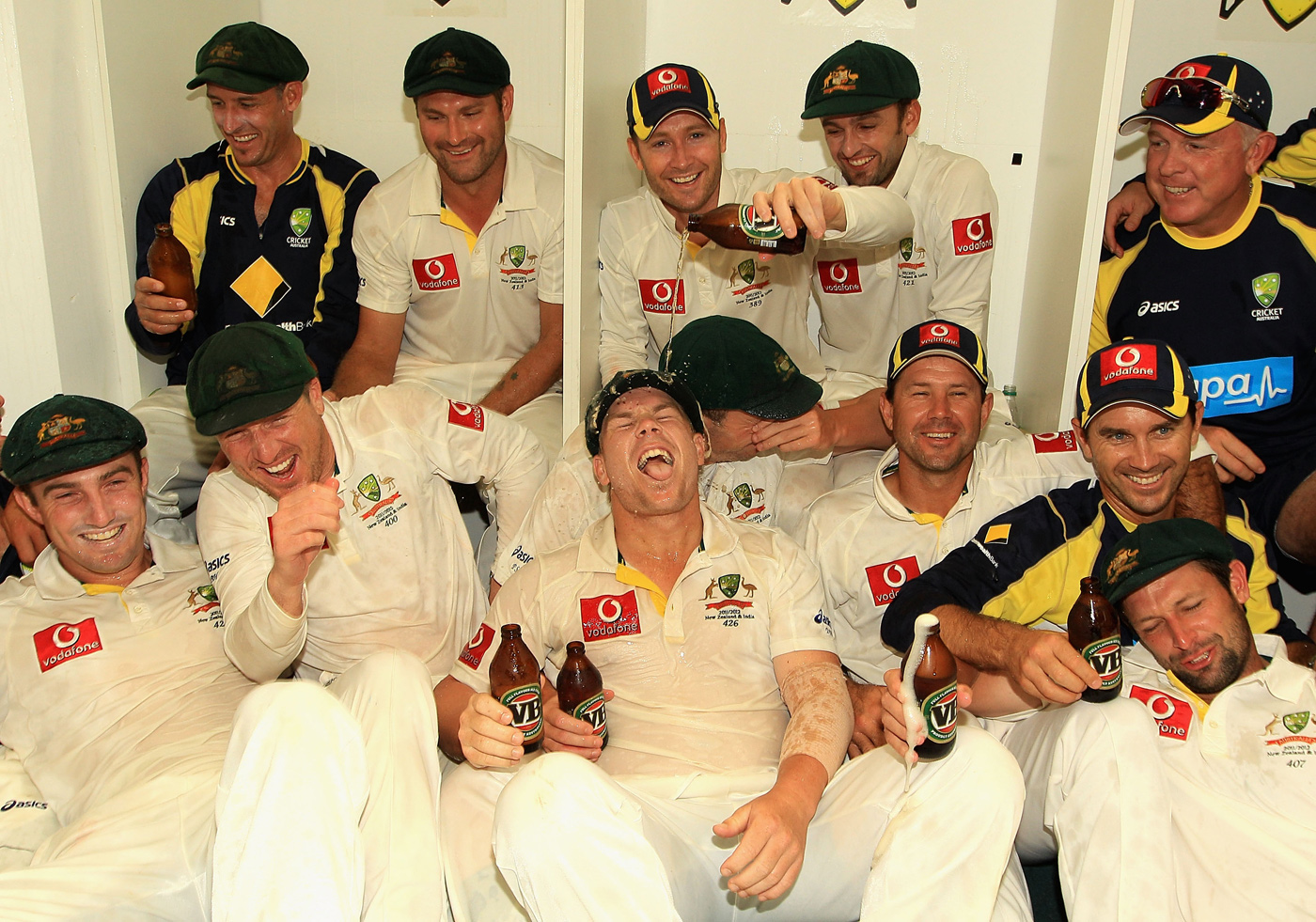October 27, 2013
Cricket players or comrades in arms?
Jonathan Wilson's analysis, here on the Cordon, of cricket's workplace and the "unrealistic" expectations of player relationships it seems to generate among fans made for some very interesting reading.
Fans, of course, expect player relationships to be far more cordial and chummy than they actually are, or even could be, because - among other things - they view cricket through an imaginative and hopeful lens, one that refracts and distorts and magnifies and colours in all sorts of ways. We view cricket not as a series of prosaic encounters of bat and ball wielded by salaried men, but rather as the stage and setting for a variety of noble encounters that resolve archetypal conflicts. We populate this stage with a variety of stock characters: heroes (our side), villains (their side), damsels in distress (the nations the players represent, which need rescuing from all manner of insults), scapegoats (those on our side who fail us and must be blamed for the defeats that could not possibly be our just fate), traitors (see:scapegoat), village idiots (sometimes umpires, sometimes opponents, sometimes selectors, sometimes our own team), magicians, gnomes and wise men (the captains, and now increasingly the coaches, all capable of changing the fortunes of nations and groups of men with mysterious incantations and potions). And so on.
The vision of cricket afforded by these lenses is one that cricket writers, going back to the game's earliest days, and television producers and commentators in more recent times, have drawn on and embellished. It is one whose moral universe is relatively unambiguous, whose human relationships follow smooth, predictable trajectories; its decision-makers experience little cognitive dissonance, whether ethical, strategic or tactical; where rough edges are miraculously smoothed out by good intentions and ceaseless striving. The only reward our heroes expect is adulation and fame and the gratitude of adoring nations.
I do not mean to suggest that such is the fan's consciously distorted view of a game; rather it is that every fan's experience and interpretation of the game is not without its component of unconscious or subconscious fantasy imposed on its visible proceedings.
One set of prominent stock characters that populate this stage for the fan are drawn from stories of adventure and war, where "bands of brothers" or "comrades in arms" face adversity and the enemy as a united front and ultimately emerge triumphant. A magical brew of togetherness is stewed, one made more potent by mutual respect and affection and something called "team spirit"; it overcomes all opponents. Among this band of brothers, there is fraternity and camaraderie; there is much backslapping and shoulder-to-shoulder support; there are handshakes and there is mateship; everyone has someone's back. This a bunch of soldiers, united together, perhaps like the "pal battalions" of Kitchener's Army, going off to fight the good battle.
The modern team knows of this image and it draws on it in its public-relations exercises and its team-building manoeuvres; there is talk of visiting war memorials and cemeteries; "boot camps" are conducted, sometimes in jungles, sometimes in mountains; team members speak glowingly of the dressing-room "atmosphere", one made especially salubrious for some by long hours of drinking together; players speak glowingly of their trench buddies and their "partnerships".
In this understanding of the game, the workplace picture of men and their trades, engaged in work for wages, possibly drawn into all manners of conflict, on or off the field, with their co-workers or "management", is a jarring disruption. It is not one that sits comfortably with our imagined conceptions of what takes place on a cricket field. It is not how we "enjoy" the game. It is not how the game functions for us, or how we make sense of, and ascribe meaning to, the "hallowed 22 yards" far away, dimly glimpsed, out there in the middle.
Do team-mates have to get along?
There is often an assumption among fans that team-mates are all great friends. After all, whenever we see them, they are forever hugging each other or high-fiving, and most of them are incapable of getting through a post-match interview without talking collectively of "the lads" or "the boys", and insisting that "the spirit" has never been better.
Our own experience of sport, whether it's a frenetic five-a-side on a Thursday night or a leisurely 35-over game on a Sunday, tells us that the people you play with, while there might be the odd niggle - "Why will Mike not stop hitting it long?", "When did Tom last buy a round?", "Will Steve ever stop banging on about that trial he had with Leicestershire in 1972?" - are essentially people you quite enjoy having a drink with afterwards.
Ricky Ponting's comments in his autobiography on Michael Clarke come as a reminder that among professionals those niggles are often far more serious. "Away from cricket, he moved in a different world to the rest of us," Ponting wrote. "It never worried me if a bloke didn't want a drink in the dressing-room, but I did wonder about blokes who didn't see the value in sticking around for a chat and a laugh and a post-mortem on the day's play. This was the time when we could revel in our success, pick up the blokes who were struggling, and acknowledge the guys who were at the peak of their powers. Pup hardly bought into this tradition for a couple of years and the team noticed."
The tone is reasonably diplomatic, and Ponting goes out of his way to stress that Clarke wasn't ever "disruptive" and that there was no suggestion he was slacking or not putting in the effort in training, but the episodes with Simon Katich and Mike Hussey suggest just how deep that frustration ran. Clarke was not, for want of a better term, one of them, and reading between the lines, the more traditional players wondered whether he felt himself better than them.
Jarrod Kimber wrote in the first issue of the Nightwatchman about how Clarke is representative of a shift in Australian masculinity from hairy-chested beer-swilling to manicured cocktail-sipping, and that probably didn't help, but the truth is that in any team there's a player or two who has to shoot off immediately after play, whether because they are too busy or because they have promised their wife or just because they don't much like sitting around having a beer. When things are going well, that's not a problem; when things are going badly, you can guarantee they are the ones who'll be slagged off in the clubhouse afterwards.
The issue then is chicken-and-egg: do they not hang around because they are self-centred in how they approach the game, or do they become self-centred because the rest of the team regards them with suspicion?
Of course, in this regard the major difference between professionals and happy weekend amateurs is the stakes. We grumble about a team-mate who never passes or scores too slowly because it might cost us the game and because we want to be involved as much as possible. A Test cricketer fumes about it because he is playing for his nation in front of an audience of millions and because defeats can cost contracts.
Yet does it really matter if team-mates get on? The great Dutch football coach Rinus Michels, architect of Total Football, pioneers what he termed the Conflict Principle: he felt if his players became too comfortable they would lose their edge. Look at most workplaces. While you will get groups of friends, most people just rub along and wouldn't dream of socialising with their workmates once they had moved on to a different job.
Dressing rooms, it's easy for fans and amateurs to forget, are just workplaces. Everybody is fighting under one banner, and yet at the same time they are fighting for preferment with each other. If you do lose the game and the pressure comes for changes, you don't want to be the one whose match figures were 0 for 185, just as when cutbacks come in an office, you don't want to be the one whose sales figures dropped by 10% over the previous year. Football club dressing rooms are probably even worse, given the frequency with which players move on: why stick up for the idiot winger who never tracks back when the chances are you'll be playing for different teams next year anyway? It comes as no great surprise when the combative Roy Keane says he made no friends in football, but it's rather more startling when the genial Niall Quinn, seemingly the epitome of the tough but easy-going, hard-drinking Irishman, admits he didn't either.
So long as players aren't wilfully undermining each other - as the crowd favourite Len Shackleton did when Sunderland broke the world transfer record to sign Trevor Ford and, fearing for his status, began delivering crosses so loaded with spin they were impossible to control, before turning to the fans and shrugging - it doesn't seem much to matter. If you don't deliberately run them out or start texting details of technical flaws to the opposition, it doesn't much matter whether you'd go to their wedding - so long as things are going well. Under stress, fault lines will always be exposed.
So what is team spirit? Does it exist and is it important? It's clearly true that certain players for certain countries - and particularly nations that are in the process of rebuilding after revolution or war: Croatia in 1996 and 1998 or Bosnia today in football - do at times seem inspired by notions of patriotic duty, but for the most part team spirit seems something of a myth, a nebulous togetherness generated when things are going well. As the former Tottenham and Barcelona striker Steve Archibald once noted in a moment of unusual eloquence, perhaps aided by a wistful translation into Spanish and out again, "Team spirit is a chimera glimpsed in the moment of victory."

